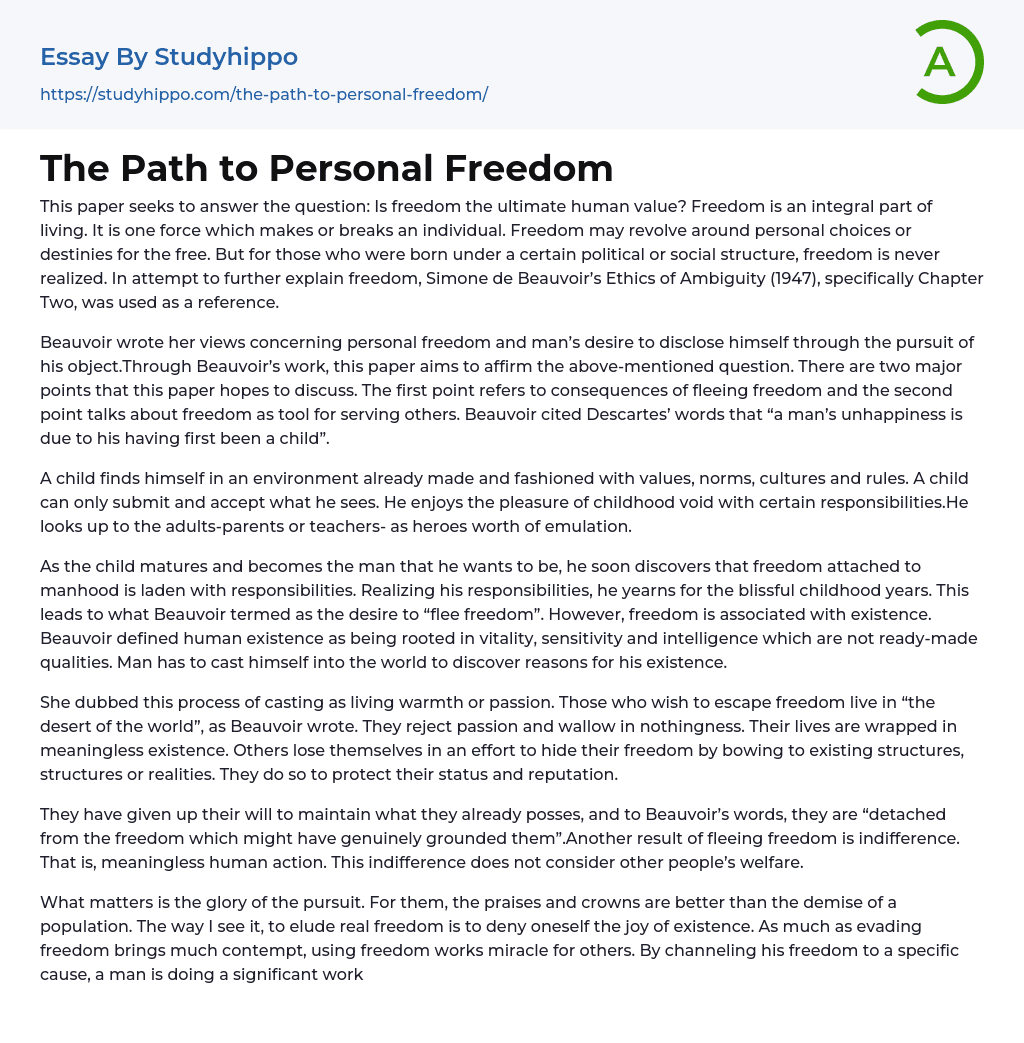This paper seeks to answer the question: Is freedom the ultimate human value? Freedom is an integral part of living. It is one force which makes or breaks an individual. Freedom may revolve around personal choices or destinies for the free. But for those who were born under a certain political or social structure, freedom is never realized. In attempt to further explain freedom, Simone de Beauvoir’s Ethics of Ambiguity (1947), specifically Chapter Two, was used as a reference.
Beauvoir wrote her views concerning personal freedom and man’s desire to disclose himself through the pursuit of his object.Through Beauvoir’s work, this paper aims to affirm the above-mentioned question. There are two major points that this paper hopes to discuss. The first point refers to consequences of fleeing freedom and the second point talks about freedom as tool for serving others. Beauv
...oir cited Descartes’ words that “a man’s unhappiness is due to his having first been a child”.
A child finds himself in an environment already made and fashioned with values, norms, cultures and rules. A child can only submit and accept what he sees. He enjoys the pleasure of childhood void with certain responsibilities.He looks up to the adults-parents or teachers- as heroes worth of emulation.
As the child matures and becomes the man that he wants to be, he soon discovers that freedom attached to manhood is laden with responsibilities. Realizing his responsibilities, he yearns for the blissful childhood years. This leads to what Beauvoir termed as the desire to “flee freedom”. However, freedom is associated with existence. Beauvoir defined human existence as being rooted in vitality, sensitivity and intelligence which are not ready-made qualities. Man has to
cast himself into the world to discover reasons for his existence.
She dubbed this process of casting as living warmth or passion. Those who wish to escape freedom live in “the desert of the world”, as Beauvoir wrote. They reject passion and wallow in nothingness. Their lives are wrapped in meaningless existence. Others lose themselves in an effort to hide their freedom by bowing to existing structures, structures or realities. They do so to protect their status and reputation.
They have given up their will to maintain what they already posses, and to Beauvoir’s words, they are “detached from the freedom which might have genuinely grounded them”.Another result of fleeing freedom is indifference. That is, meaningless human action. This indifference does not consider other people’s welfare.
What matters is the glory of the pursuit. For them, the praises and crowns are better than the demise of a population. The way I see it, to elude real freedom is to deny oneself the joy of existence. As much as evading freedom brings much contempt, using freedom works miracle for others. By channeling his freedom to a specific cause, a man is doing a significant work to liberate others.His passion, which is the core of his existence, overflows when freedom is used to empower and lift others from certain circumstances. This takes into account the presence of other humans, defining them as co-workers or even friends, not as a means to an end. Those who have the will can use their freedom to speak up for the oppressed and defend the weak.
By doing so, he makes his presence or existence known to others. As Beauvoir wrote, “man can find justification of
his own existence only in the existence of other men”. My views are one with this statement. Therefore, using freedom for other’s sake is a noble feat.Freedom is an ultimate human value. Denying it may lead to possible consequences, stripping a man of his genuine identity and worth.
On the other hand, using freedom for the good of others is liberating- both to the man himself and the humans he serve with. Freedom is a conscious choice. It is not imposed or forced. We, humans, are born with it to maximize our potential. The path to personal freedom is to embrace freedom together with the responsibilities in all honesty and acceptance. Letting go of this human privilege is like signing our own death sentence.
- Values of Life essays
- Ethical dilemma essays
- Normative Ethics essays
- Virtue Ethics essays
- Belief essays
- Deontology essays
- Moral essays
- Virtue essays
- Work Ethic essays
- Acceptance essays
- Age Of Enlightenment essays
- Child Observation essays
- Confucianism essays
- Conscience essays
- Critical Reflection essays
- Destiny essays
- Determinism essays
- Empiricism essays
- Environmentalism essays
- Epistemology essays
- Ethics essays
- Ethos essays
- Existence essays
- Existentialism essays
- Fate essays
- Free Will essays
- Functionalism essays
- Future essays
- Good And Evil essays
- Human Nature essays
- Individualism essays
- Meaning Of Life essays
- Metaphysics essays
- Natural Law essays
- Personal Philosophy essays
- Philosophers essays
- Philosophy Of Life essays
- Political Philosophy essays
- Pragmatism essays
- Reality essays
- Relativism essays
- Teaching Philosophy essays
- Time essays
- Transcendentalism essays
- Truth essays
- Utilitarianism essays
- Activity essays
- Believe essays
- Comfort Zone essays
- Dance essays




